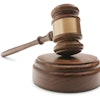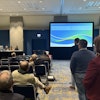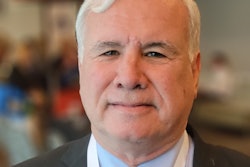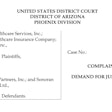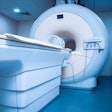
Radiologists who testify as expert witnesses in medical malpractice cases have similar qualifications regardless of the side they're working for. This could help ensure fair trials, say the authors of research published May 30 in the Journal of the American College of Radiology.
A team led by Dr. Kenneth Tharp from Emory University found that while defense-only radiologists had slightly fewer years of practice experience than plaintiff-only experts, both groups are similar when it comes to practice type and subspecialty mix. This also goes for the numbers of publications, citations, and h-indices (a measure for evaluating academic output) that radiologists have.
This contrasts with other medical specialties, for which studies have suggested that specialists who are expert witnesses for the defense tend to have higher qualifications than those testifying for plaintiffs.
"Published practice parameter guidelines and experts' ability to blindly review archived original images might together explain this interspecialty discordance," Tharp and colleagues wrote.
Research suggests that radiologists spend about 10% of their careers on average with open unresolved malpractice claims. The amount of time spent on such litigation can contribute to physician self-doubt, depression, and burnout.
Nearly all medical malpractice lawsuits involve expert witnesses since these cases involve specialized and technical medical knowledge that juries may have difficulty understanding.
Expert witness characteristics have been studied in anesthesiology, neurosurgery, orthopedic surgery, and otolaryngology. Previous research suggests that experts serving for defense teams show higher qualifications on an objective basis. Radiologists may also serve as expert witnesses, but there is a lack of data on their characteristics and qualifications when serving on either defense or plaintiff teams.
"Such information could inform ongoing development of guidelines and best practice documents," the authors wrote.
Tharp and colleagues wanted to evaluate the characteristics of radiologists serving as experts in medical malpractice legal cases. They looked at data taken between 2010 and 2019 from 179 radiologists who testified in 231 lawsuits. Out of these, 143 testified in one case (58 defense, 85 plaintiff) and 36 testified in multiple cases (10 defense-only, 14 plaintiff-only, 12 both).
The researchers found that the 68 defense-only experts had fewer years of experience with an average of 28.3 years compared to the 99 plaintiff-only experts at 31.8 years (p = 0.02).
However, the team also found that both groups were otherwise similar in several other areas.
| Characteristics of radiologists serving on defense or plaintiff sides of malpractice litigation | ||
| Radiology expert characteristic | Defense | Plaintiff |
| Percent academic | 44.6% | 54.9% |
| Percent subspecialist | 63.8% | 65.8% |
| Number of publications | 60.5 | 62.8 |
| Number of citations | 1,994.1 | 2,309.2 |
| H-index | 17.2 | 16.8 |
| Ivy League medical school | 11.3% | 11.1% |
Tharp et al also found no significant differences in radiology experts by geographic region in the U.S.
"Our findings about radiologist expert witnesses thus differ substantially from those previously reported for other clinical specialties in which experts serving for defense counsel typically had stronger qualifications across a variety of characteristics than those serving for plaintiff counsel," they added.
Professional societies have practice parameters and standards documents in place intended for best practices for physicians serving as expert witnesses. Expert credentials can sway juries and affect case outcomes. The study authors wrote that this is one reason why high-quality experts for both parties help to make sure trials are fair.
"In contrast to previously reported differences in the quality of defense versus plaintiff expert witnesses in other specialties, similar qualifications of experts for both sides in radiology matters may result in less biased jury decisions," they added.


